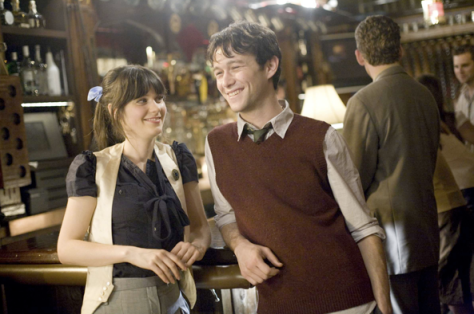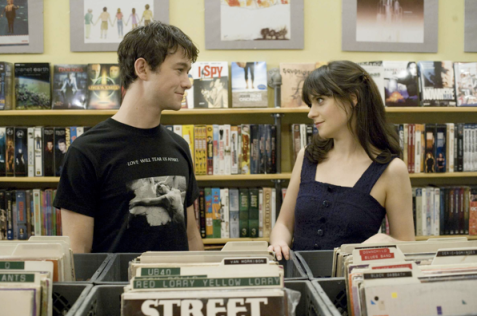(500) Days of Summer- An Anti-Romcom That Warms and Breaks The Heart

There are enough moments in (500) Days of Summer that hit the mark so perfectly that any perceivable flaws the film might carry are erased with the width of your grin or the clench of your gut. It uses the flights of fancy from many romantic comedies, throws them all into a pot, and makes a terrific jambalaya out of them. Many of you will see this film and be immediately put off, dismissing it as too “indie quirky” for its own good. Others will be won over from the opening moments, and I’m pleased to report I fell into the latter category, despite often being rubbed the wrong way by “indie quirk” in films such as this. The fantasy elements strike into the viewer’s emotional reality– truly the rarest of cinematic magic. The movie also takes the male perspective on romance, making it the unusual romcom that will play equally to both genders in an audience. It’s a coming-of-age tale, it’s a meditation on fate, and it’s an indie comedy about the nature of love, despite the fact that it tells you upfront: it’s NOT a love story.
The film begins with the following written on the screen: “Author’s Note: The following is a work of fiction. Any resemblance to persons living or dead is purely coincidental. Especially you Jenny Beckman. Bitch.” If that doesn’t set the tone for you, I don’t know what will. We are introduced to a boy, Tom (Joseph Gordon-Levitt), and a girl, Summer (Zooey Deschanel). Over the opening credits, we see images of them as children growing up, and we get a sense of the stars aligning and fate leading up to the moment they meet. Only we know it doesn’t work that way– the film jumps forward in time, showing us a heartbroken Tom and a cold Summer, then back to the moments where it all began. Just as we recall failed relationships in our mind as a scattering of memories, many good, some bad, the film refuses to “remember” events chronologically. We see Tom desperately turning the knobs on the sinks on display in Ikea, trying to make her laugh, saying, “Honey, our sink is broken!” as Summer rolls her eyes. We then jump back to the beginning, where we learn Summer originated the joke– when we recall memorable moments in relationships, we lump together the moments when they appear. It’s not merely a structural gimmick, it makes the film feel true.

A plot summary does no good, but a few scenes do deserve special mention. After the first time they spend the night together, Tom walks down the road to Hall and Oates’ “You Make My Dreams Come True,” and everyone around him breaks into a big group dance– he even looks into his reflection in a car window and sees Harrison Ford as Han Solo winking back at him. People say that musicals are corny (and certainly Hall and Oates may qualify as corny in many circles), but when in love, you feel on top of the world in a way that only music can describe. Another scene, when Tom believes he can win Summer back at a party, plays out in split screen, with Tom’s expectations on one side and the reality on another. If you’ve ever gone into a situation, and played out in your mind a million times how you want it to occur, and then watched from a distance as your plans fail (which I believe most red-blooded human beings have), this scene will be absolutely shattering.
Yet another scene shows Tom going to the movies in an attempt to move on from his heartbreak, and he sees himself in a variety of foreign films. The writers, Scott Neustadter and Michael Weber, and the director, Marc Webb, recognize the parallel– this is a romantic comedy for guys, for any guy who has fallen hard for a girl, for any guy who has had his heart broken, for any guy who has grown disenchanted with the notions of love and fate after undergoing immense suffering at the hands of the fairer sex. One goes to movies and sees a history of heartbreak and torture play out in a variety of romances, both comedic and dramatic, and when a film is done well, you plant yourself directly into the character’s shoes. Joseph Gordon-Levitt is the perfect actor for this task– he pulls off a variety of emotions while never straining to be charming. In fact, he’s not afraid to come across as idealistic, obsessive, or overly dramatic. These are, after all, the ways we behave when it comes to matters of the heart, especially in youth.

Zooey Deschanel has the less forgiving task, and thus the much more difficult one. She has to be this man’s ideal woman, with a sense of mystery and mythology around her as Aphrodite, the Indie Goddess, while believably turning cold by the end. She is given no other friends, and she certainly has a dark past, so it is hard to root for her… but again, as a film made by guys and from the perspective of a male main character, perhaps all of these changes are correct. We never see how girls act in private with their friends, why should Tom? She is photographed lovingly by Marc Webb, who shows several loving close-ups as Tom describes the things he loves about her– and then rolls the same footage as Tom rips her apart when he’s upset. The very things he loved become annoying and less than ideal… why did he even like them in the first place, he wonders? Or does he still like them, and he has merely risen some high defenses? Of course he still has strong feelings for Summer, even at the end of the relationship– another thing that is absolutely true at the end of this film, since so shortly after separation, no former couple can experience complete indifference.
Despite the film’s claims that it’s not a love story, it has a great deal to say on the subject and manages to gracefully pull off a happy ending, though it’s not the one you may expect. Neither person is at fault, and neither person fails to grow from the experience. While the film plays with fantastical elements, it creates a far more realistic sense of the gamut of human emotions than any standard romcom could dream of. It’s a little too plotless, and we’re a little too aware of what the film wants from us, for it to reach perfection. Still, at year’s end, you’ll still be reliving the memories from this film. Though not necessarily in chronological order.
Note: The narrator for the film has a perfect baritone timbre and wry delivery– I enjoyed every time he spoke, and his qualities as a narrator made the film feel all the more epic and fateful. It’s the best voiceover narration in a film in a long time, even better than last year’s terrific, subtly critical narrator in Woody Allen’s Vicky Cristina Barcelona.




I loved Adventureland, and got a lot of the same feel-good sensation while walking out of this movie. Don’t think I can ever listen to the Hall and Oates song again without a flashback. Once again, Joe Morgenstern is too pretentious for his own good (about this movie).
marshall said this on August 25, 2009 at 4:55 am |
[…] Lord and Chris Miller- Cloudy With a Chance of Meatballs 9. Scott Neustadter and Michael H. Weber- (500) Days of Summer 8. Greg Mottola- Adventureland 7. Scott Z. Burns- The Informant! 6. Bob Peterson, Pete Docter, and […]
Best of 2009: The Definitive List of Top Tens « The Password is Swordfish said this on February 20, 2010 at 4:27 am |